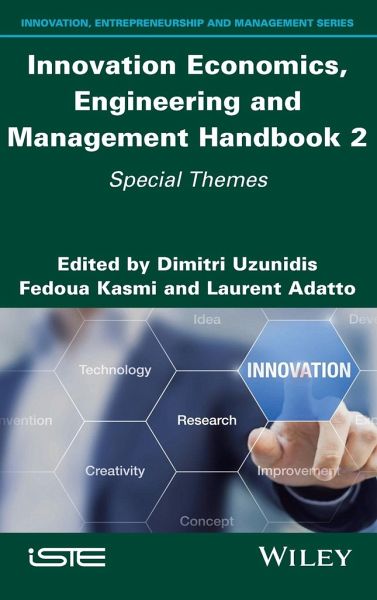
Innovation Economics, Engineering and Management Handbook 2
Special Themes
Herausgegeben: Uzunidis, Dimitri; Kasmi, Fedoua; Adatto, Laurent
Versandkostenfrei!
Versandfertig in über 4 Wochen
159,99 €
inkl. MwSt.
Weitere Ausgaben:

PAYBACK Punkte
80 °P sammeln!
Innovation, in economic activity, in managerial concepts and in engineering design, results from creative activities, entrepreneurial strategies and the business climate. Innovation leads to technological, organizational and commercial changes, due to the relationships between enterprises, public institutions and civil society organizations. These innovation networks create new knowledge and contribute to the dissemination of new socio-economic and technological models, through new production and marketing methods.Innovation Economics, Engineering and Management Handbook 2 is the second of the...
Innovation, in economic activity, in managerial concepts and in engineering design, results from creative activities, entrepreneurial strategies and the business climate. Innovation leads to technological, organizational and commercial changes, due to the relationships between enterprises, public institutions and civil society organizations. These innovation networks create new knowledge and contribute to the dissemination of new socio-economic and technological models, through new production and marketing methods.
Innovation Economics, Engineering and Management Handbook 2 is the second of the two volumes that comprise this book. The main objectives across both volumes are to study the innovation processes in today?s information and knowledge society; to analyze how links between research and business have intensified; and to discuss the methods by which innovation emerges and is managed by firms, not only from a local perspective but also a global one.
The studies presented in these two volumes contribute toward an understanding of the systemic nature of innovations and enable reflection on their potential applications, in order to think about the meaning of growth and prosperity
Innovation Economics, Engineering and Management Handbook 2 is the second of the two volumes that comprise this book. The main objectives across both volumes are to study the innovation processes in today?s information and knowledge society; to analyze how links between research and business have intensified; and to discuss the methods by which innovation emerges and is managed by firms, not only from a local perspective but also a global one.
The studies presented in these two volumes contribute toward an understanding of the systemic nature of innovations and enable reflection on their potential applications, in order to think about the meaning of growth and prosperity




